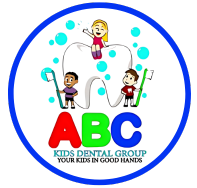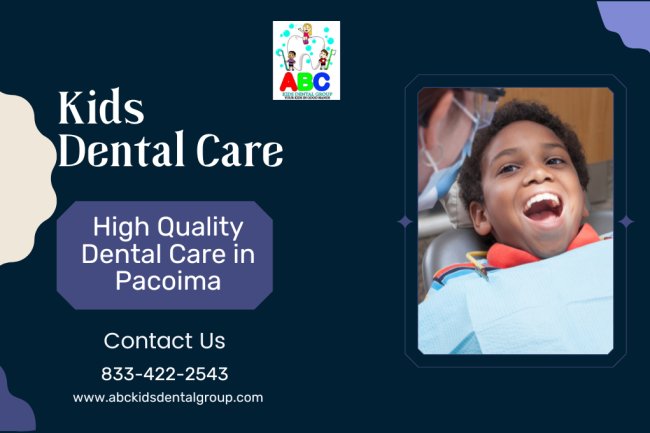Healthy Smiles Start Here: The Importance of Regular Checkups and Proper Oral Care
Ensure a healthy smile with regular dental checkups, cleanings, and proper at-home oral care routines.

Healthy Smiles Start Here: The Importance of Regular Checkups and Proper Oral Care
At ABC Kids Dental Group, we believe that a healthy smile is a foundation for a lifetime of confidence, well-being, and overall health. Regular dental checkups and proper oral care are essential components of maintaining a healthy, bright smile for both children and adults. This comprehensive guide explores why consistent dental visits and good oral hygiene practices are crucial for oral health, prevention of dental issues, and overall well-being.
1. The Role of Regular Dental Checkups
Regular dental checkups are more than just routine visits; they are vital for maintaining optimal oral health. These checkups allow dentists to monitor your oral health, identify potential issues early, and provide preventive treatments to keep your smile healthy and beautiful. For children, early dental visits establish a positive relationship with the dentist and lay the groundwork for a lifetime of good oral hygiene habits.
A. Early Detection and Prevention
One of the primary benefits of regular dental checkups is the early detection of oral health issues. During a checkup, dentists can identify cavities, gum disease, and even oral cancer in their earliest stages when they are most treatable. Early intervention can prevent minor problems from developing into more serious conditions that require extensive treatment.
B. Professional Cleanings
Even with diligent brushing and flossing, some areas in the mouth are difficult to clean effectively. Plaque can harden into tartar, which can only be removed by a dental professional. During a checkup, your dentist or hygienist will perform a thorough cleaning to remove plaque and tartar buildup, helping to prevent cavities and gum disease.
C. Personalized Oral Care Advice
Each person’s mouth is unique, and a one-size-fits-all approach to oral care doesn’t work for everyone. During a checkup, your dentist can provide personalized advice on brushing and flossing techniques, recommend oral care products, and address any specific concerns you may have. This tailored approach ensures that you are taking the best possible care of your teeth and gums.
2. The Importance of Routine Dental Cleanings
Routine dental cleanings are a key aspect of preventive care. They go beyond what can be achieved with regular brushing and flossing, targeting hard-to-reach areas and removing buildup that can lead to dental problems. Regular cleanings help keep your teeth and gums healthy and contribute to a brighter, more confident smile.
A. What to Expect During a Dental Cleaning
During a dental cleaning, a hygienist will use specialized tools to remove plaque and tartar from the surfaces of your teeth and along the gumline. This process, known as scaling, is followed by polishing, which helps to remove surface stains and leave your teeth feeling smooth and clean. Finally, a fluoride treatment may be applied to strengthen the enamel and protect against cavities.
B. Benefits of Routine Cleanings
Routine cleanings help prevent cavities, gum disease, and other oral health issues by removing harmful bacteria and buildup. They also help to maintain fresh breath and a bright, attractive smile. Additionally, cleanings provide an opportunity for your dental team to monitor your oral health and recommend any necessary treatments or adjustments to your oral care routine.
C. Frequency of Cleanings
The American Dental Association recommends that most people have their teeth professionally cleaned twice a year. However, some individuals, particularly those with a history of gum disease or other dental issues, may benefit from more frequent cleanings.
3. Establishing Good Oral Hygiene Habits at Home
While regular dental visits are essential, maintaining good oral hygiene at home is equally important. Proper brushing, flossing, and other daily habits can significantly reduce the risk of cavities, gum disease, and other dental problems.
A. The Basics of Brushing
Brushing your teeth twice a day with fluoride toothpaste is the foundation of good oral hygiene. Use a soft-bristled toothbrush and gentle circular motions to clean all surfaces of your teeth and gums. Pay special attention to the gumline and hard-to-reach areas. Replace your toothbrush every three to four months, or sooner if the bristles are frayed.
B. The Importance of Flossing
Flossing is a crucial step in oral care that removes food particles and plaque from between the teeth and under the gumline, where a toothbrush cannot reach. Floss at least once a day, using a gentle sawing motion to guide the floss between your teeth. If traditional flossing is challenging, consider using interdental brushes or a water flosser.
C. Additional Oral Care Tools
Mouthwash, tongue scrapers, and interdental brushes can enhance your oral hygiene routine. Mouthwash helps to reduce bacteria and freshen breath, while tongue scrapers remove bacteria from the surface of the tongue. Interdental brushes can be especially helpful for cleaning around braces or dental implants.
D. Healthy Lifestyle Choices
Diet and lifestyle choices play a significant role in oral health. Limit sugary snacks and drinks, as they can contribute to tooth decay. Drink plenty of water, and eat a balanced diet rich in fruits, vegetables, and dairy products to support strong teeth and gums. Avoid tobacco products, as they increase the risk of gum disease and oral cancer.
4. Pediatric Dentistry: Building Healthy Habits for a Lifetime
Establishing good oral hygiene habits early in life is critical for long-term oral health. Pediatric dentistry focuses on the unique needs of children and helps them develop positive attitudes toward dental care.
A. The Importance of Early Dental Visits
The American Academy of Pediatric Dentistry recommends that children have their first dental visit by their first birthday. Early visits help to establish a dental home, where children can receive preventive care and parents can learn how to care for their child’s teeth and gums.
B. Preventive Care for Children
Preventive care for children includes regular checkups, cleanings, fluoride treatments, and dental sealants. Sealants are a protective coating applied to the chewing surfaces of the back teeth to prevent cavities. Educating children on proper brushing and flossing techniques and encouraging healthy eating habits are also essential components of pediatric dental care.
C. Managing Dental Anxiety
Dental anxiety is common among children and can make dental visits challenging. Pediatric dentists are trained to create a welcoming, child-friendly environment that helps to alleviate fear and anxiety. Parents can also help by preparing their child for the visit and using positive reinforcement to reward good behavior.
5. The Link Between Oral Health and Overall Health
Oral health is closely connected to overall health. Poor oral hygiene can contribute to systemic conditions, while good oral health can improve overall well-being.
A. The Oral-Systemic Connection
Research has shown that oral health is linked to several systemic conditions, including heart disease, diabetes, and respiratory issues. Bacteria from the mouth can enter the bloodstream and contribute to inflammation and infection in other parts of the body. Conversely, systemic conditions can affect oral health, making it more difficult to manage.
B. Oral Health and Quality of Life
Oral health also impacts quality of life. Dental problems can cause pain, difficulty eating and speaking, and embarrassment about one’s appearance. Regular dental care can help to prevent these issues, improving overall quality of life and self-confidence.
6. Overcoming Barriers to Dental Care
Despite the importance of regular dental visits, many people face barriers to accessing dental care. Addressing these barriers is essential to ensuring that everyone can enjoy the benefits of good oral health.
A. Dental Anxiety and Fear
Dental anxiety is a common barrier to seeking care. Open communication with your dentist, relaxation techniques, and sedation options can help to manage anxiety and make dental visits more comfortable.
B. Cost Concerns
Cost is another significant barrier to dental care. Many dental offices offer payment plans or accept insurance to help make care more affordable. Preventive care, such as regular checkups and cleanings, can also reduce the need for more costly treatments in the future.
C. Accessibility
Accessibility can be an issue for people living in rural areas or those with mobility challenges. Some dental practices offer mobile services or transportation assistance to help patients access the care they need.
7. The Long-Term Benefits of a Healthy Smile
Investing in regular dental care and good oral hygiene habits pays off in the long run. The benefits of a healthy smile go beyond aesthetics, contributing to overall health, well-being, and confidence.
A. Prevention of Dental Issues
Regular dental visits and proper oral care can prevent many common dental issues, such as cavities, gum disease, and tooth loss. Early detection and treatment of problems can also prevent more serious complications.
B. Enhanced Quality of Life
A healthy smile can improve quality of life by making it easier to eat, speak, and socialize. It can also boost self-esteem and confidence, which are essential for personal and professional success.
8. Commitment to Your Child’s Smile at ABC Kids Dental Group
At ABC Kids Dental Group, we are committed to providing comprehensive, compassionate dental care for children and families. Our team of experienced pediatric dentists and friendly staff work together to create a positive, welcoming environment where children can learn to love taking care of their teeth. We believe that healthy smiles start with regular checkups, professional cleanings, and good oral hygiene habits at home.
A. Our Comprehensive Services
We offer a full range of pediatric dental services, including preventive care, restorative treatments, and orthodontic evaluations. Our goal is to help children develop healthy habits that will last a lifetime and ensure that their smiles are as bright and healthy as possible.
B. Creating a Positive Dental Experience
We understand that visiting the dentist can be intimidating for children, so we strive to make each visit as comfortable and enjoyable as possible. Our office is designed with children in mind, and our staff is trained to work with kids to help them feel at ease.
C. Education and Prevention
We believe that education is a key component of good oral health. We work closely with parents and children to provide the knowledge and tools they need to take care of their teeth and gums at home. From teaching proper brushing and flossing techniques to offering nutritional advice, we are here to support your child’s oral health journey.
What's Your Reaction?























